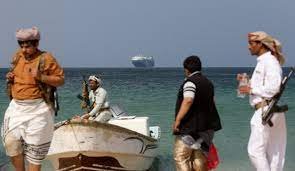US military sank three Houthi Boats
In a recent and unprecedented turn of events, the Red Sea has become the battleground for a major military engagement between the United States and Houthi fighters from Yemen. The clash, occurring on Sunday, unfolded as a response to weeks of Houthi attacks on ships passing through the Bab el-Mandeb strait into the Red Sea. The maritime tensions have escalated to the point where the US military sank three Houthi vessels, killing 10 fighters, in what is now known as the first direct military confrontation between the two forces.
Houthi Attacks and US Response
The conflict began with Houthi attacks on ships identified as linked to Israel. The Houthis, an Iran-backed group, initiated these attacks in October, launching drones and missiles towards the southern parts of Israel. Their objective, as stated by a Houthi spokesman, was to pressure Israel to cease its devastating war and siege on the Gaza Strip, which has resulted in the tragic loss of more than 21,000 Palestinian lives.
In response to the escalating maritime threats, the US announced Operation Prosperity Guardian, a multinational effort to counter the Houthi attacks in the Red Sea. However, despite some nations joining forces with the US, others have distanced themselves from the initiative, leaving Washington to effectively navigate the situation alone.
The Red Sea Clash: How It Unfolded
On the fateful Sunday at 6:30 am Yemen time, the container ship Maersk Hangzhou issued a distress call, reporting an attack by four Houthi small boats. In response, the USS Gravely intervened, successfully intercepting two anti-ship missiles fired at the Maersk vessel. Helicopters from the USS Gravely and the USS Eisenhower were dispatched to aid the distressed container ship.
The clash marked a significant escalation, as it resulted in the death of 10 Houthi fighters and the sinking of three of their vessels. This development has raised concerns about a potential regional escalation, as the US military’s direct involvement in such a confrontation signifies a departure from previous strategies.
Houthi Motivations and the US Response
The Houthi attacks, initially targeting Israel, shifted to disrupting ships in the Red Sea. The disruption has impacted various shipping companies, leading to a temporary halt in operations by Maersk, one of the world’s largest shipping companies. The US, in response to these attacks, declared its intent to act in self-defense. According to CENTCOM, US helicopters warned Houthi fighters to stay away as they attacked a cargo ship, but when the helicopters came under fire, they retaliated, resulting in the sinking of Houthi boats and the death of the fighters.
According to CENTCOM, US helicopters warned Houthi fighters to stay away as they attacked a cargo ship, but when the helicopters came under fire, they retaliated, resulting in the sinking of Houthi boats and the death of the fighters.
A White House official emphasized the US’s commitment to acting in self-defense, signaling a potential shift in the approach towards countering Houthi aggression. The Houthi spokesman, on the other hand, confirmed the death and missing status of 10 of their fighters after the boats were attacked.
Impact on Global Maritime Trade
The Red Sea clash has immediate repercussions for global maritime trade. Maersk, along with German shipping company Hapag-Lloyd, announced a pause in all sailing through the Red Sea for the next 48 hours. Considering that these companies operate almost a quarter of the world’s shipping fleet, this decision has a significant impact on global trade routes.
Other shipping firms, such as Evergreen, have also responded to the escalating maritime conflict. Evergreen, for instance, has temporarily stopped accepting Israeli cargo. Additionally, several firms, including CH Robinson, HMM, Ocean Network Express, Wallenius Wilhelmsen, and Yang Ming Marine Transport, are planning to reroute ships around Africa’s Cape of Good Hope rather than using the Suez Canal or the Red Sea. This alternative route is longer and costlier, potentially affecting the efficiency and cost-effectiveness of global shipping.
While the attacks on shipping have had a “fairly limited” impact on the oil market so far, experts speculate that continued unrest in the region could lead to rising oil prices. The evolving situation in the Red Sea adds a layer of uncertainty to an already complex geopolitical landscape, prompting shipping companies and nations to reassess their strategies and routes.
International Response and Multinational Efforts
 Despite the announcement of a multinational maritime protection force by US Defense Secretary Lloyd Austin on December 19, the Houthis remain steadfast in their stance, insisting that they will not back down unless Israel ceases its war on Gaza. The lack of unequivocal support from several nations, leaving the US to effectively “act alone,” underscores the complexities of forming a unified front against Houthi aggression.
Despite the announcement of a multinational maritime protection force by US Defense Secretary Lloyd Austin on December 19, the Houthis remain steadfast in their stance, insisting that they will not back down unless Israel ceases its war on Gaza. The lack of unequivocal support from several nations, leaving the US to effectively “act alone,” underscores the complexities of forming a unified front against Houthi aggression.
The clash in the Red Sea has heightened concerns about the efficacy of Operation Prosperity Guardian and the ability of the US to deter Houthi attacks. With only the United Kingdom directly contributing warships to the initiative, questions arise about the broader international commitment to ensuring the security of vital maritime routes.
Geopolitical Implications
As the situation in the Red Sea continues to unfold, the clash between the US military and Houthi fighters raises critical questions about the stability of global maritime trade routes, the effectiveness of multinational efforts, and the potential for broader regional escalation. The impact on shipping companies, the redirection of vessels, and the geopolitical implications of these events underscore the need for a comprehensive and coordinated international response. As stakeholders navigate these uncertain waters, the world watches closely, aware that the outcome of this conflict will have far-reaching consequences for global trade, security, and geopolitical dynamics.











Comments 1